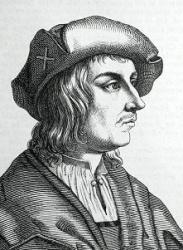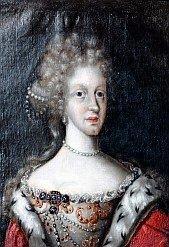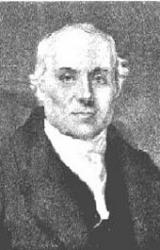
1532 - 1598 Topics: The Word Law and Gospel Author of "Lord, Help Us Ever to Retain" in The Lutheran Hymnal Helmbold, Ludwig, son of Stephan Helmbold, woollen manufacturer at Muhlhausen, in Thuringia, was born at Mühlhausen, Jan. 13, 1532, and educated at Leipzig and Erfurt (B.A. in 1550). After two years' headmastership of the St. Mary's School at Mühlhausen, he returned to Erfurt, and remained in the University (M.A. 1554) as lecturer till his appointment in 1561 as conrector of the St. Augustine Gymnasium at Erfurt. When the University was reconstituted in 1565, after the dreadful pestilence in 1563-64, he was appointed dean of the Philosophical Faculty, and in 1566 had the honour of being crowned as a poet by the Emperor Maximilian II., but on account of his determined Protestantism he had to resign in 1570. Returning to Mühlhausen, he was appointed, in 1571, diaconus of the St. Mary's Church, and 1586, pastor of St. Blasius's Church and Superintendent of Mühlhausen. He died at Mühlhausen, April 8, 1598. (Koch, ii. 234-248; Allgemeine Deutsche Biographie xi. 701-702; Bode, pp. 87-88, &c.)
Helmbold wrote many Latin hymns and odes, and numerous German hymns for school use, including a complete metrical version of the Augsburg Confession. His Hymns for church use are mostly clear and concise paraphrases of Scripture histories and doctrines, simple and earnest in style. Lists of the works in which his hymns appeared (to the number of some 400) are given by Koch and Bode.
His hymns translated into English are:—
i. Herr Gott, erhalt uns für und für. Children. On the value of catechetical instruction as conveyed in Luther's Catechism for Children. First published in Helmbold's Dreyssig geistliche Lieder auff die Fest durchs Jahr. Mühlhausen, 1594 (preface to tenor, March 21, 1585), and thence in Wackernagel, iv. p. 677, and Mützell, No. 314, in 4 stanzas of 4 lines in Porst's Gesang-Buch, ed. 1855, No. 977. The only translation in common use is:—
O God, may we e'er pure retain, in full, by Dr. M. Loy, in the Ohio Lutheran Hymnal 1880.
ii. Nun lasst uns Gott dem Herren. Grace after Meat. Included in his Geistliche Lieder, 1575, in 8 stanzas of 4 lines, and thence in Wackernagel, iv. p. 647, and the Unverfälschter Liedersegen, 1851, No. 500. The translations are: (1) To God the Lord be rendered," as No. 326 in pt. i. of the Moravian Hymn Book, 1754. (2) "Now let us praise with fervour," in the Supplement to German Psalmody, ed. 1765, p. 75. (3) "To God the Lord be praises," as No. 778 in the Moravian Hymn Book 1789 (1849, No. 1153).
iii. Von Gott will ich nicht lassen. Trust in God. Lauxmann in Koch, viii. 365-370, thus relates the origin of this the best known hymn by Helmbold:—
In 1563, while Helmbold was conrector of the Gymnasium at Erfurt, a pestilence broke out, during which about 4000 of the inhabitants died. As all who could fled from the place, Dr. Pancratius Helbich, Rector of the University (with whom Helmbold bad formed a special friendship, and whose wife was godmother of his eldest daughter), was about to do so, leaving behind him Helmbold and his family. Gloomy forebodings filled the hearts of the parting mothers. To console them and nerve them for parting Helmbold composed this hymn on Psalm lxxiii. v. 23.
The hymn seems to have been first printed as a broadsheet in 1563-64, and dedicated to Regine, wife of Dr. Helbich, and then in the Hundert Christenliche Haussgesang, Nürnberg, 1569, in 9 stanzas of 8 lines Wackernagel, iv. pp. 630-33, gives both these forms and a third in 7 stanzas from a MS.[manuscript] at Dresden. Included in most subsequent hymnbooks, e.g. as No. 640 in the Unverfälschter Liedersegen, 1851. The translations in common use are:—
1. From God the Lord my Saviour, by J. C. Jacobi, in his Psalmodia Germanica, 1722, p. 139, omitting st. vii. (1732, p. 134), repeated slightly altered (and with st. vi., lines 1-4 from vii., lines 1-4 of the German) as No. 320 in pt. i. of the Moravian Hymn Book, 1754. Stanzas i.-iii., v., rewritten and beginning "From God, my Lord and Saviour," were included in the American Lutheran General Synod's Collection, 1850-52, No. 341.
2. Ne'er be my God forsaken. A good translation of stanzas i., ii., iv., by A. T. Russell in his Psalms & Hymns, 1851, No. 229.
3. From God shall nought divide me. A good translation, omitting st. ii., vii. by Miss Winkworth in her Chorale Book for England, 1863, No. 140. Partly rewritten in her Christian Singers, 1869, p. 154.
Other translations are: (l)"God to my soul benighted," by Dr. H. Mills, 1845 (1856, p. 179). (2) "From God I will not sever," by Dr. N. L. Frothingham, 1870, p. 202. [Rev. James Mearns, M.A.]
--John Julian, Dictionary of Hymnology (1907)
Ludwig Helmbold


 My Starred Hymns
My Starred Hymns









